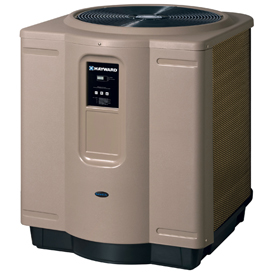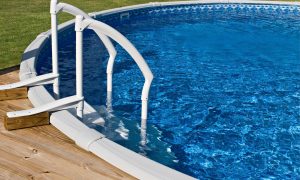Adding a pool heater is a great investment for any pool and significantly increases your swimming time. When searching for the best pool heating technology for your above-ground pool, consider an above ground pool heat pump which is the recommended method for heating this type of swimming pool.
 How Does an Above-Ground Pool Heat Pump Work?
How Does an Above-Ground Pool Heat Pump Work?
A pool heat pump runs on electricity but is different from a traditional electric pool heater in that it actually uses energy to heat the outside air and transfer it back into the pool rather than using an electric heating element to generate heat. This is more energy efficient and could be the most cost-effective method for heating various types of pools. An electric heat pump draws outside air in with a fan, where the air is converted to gas when exposed to the coil and liquid refrigerant. A compressor is used to heat the warm gas, which is then transferred back into the pump to circulate with the cool water and heat it up before returning to the pool.
Even though an electric pool heat pump uses outside air to operate, it does not have to be hot summer weather for it to work properly. The outside temperature should be at least 45°F to 50°F for an electric pool heater to work efficiently, and they are less efficient in cooler temperatures. When using an aboveground pool heat pump in Connecticut, you can often open your pool early and keep it open later than usual to gain approximately an extra two months of swimming time.
 Choosing the Best Above-Ground Electric Heat Pump
Choosing the Best Above-Ground Electric Heat Pump
You should talk with a trusted swimming pool professional about the best type of electric heat pump to get for your above-ground pool, as they can perform an analysis to help determine the right size of pool heat pump based on your swimming pool area. Factors to consider include outdoor air temperatures and the change in temperature from the environment to your pool water. Other factors that should be considered when choosing an electric heat pump include exposure to wind, humidity levels, and average temperatures during the day and on cool nights. A larger heat pump will be required for swimming pools that are exposed to low humidity, cool nights, and higher than average wind speeds.
Whether or not you use a solar cover and the amount of exposure to natural sunlight may also affect the type of heater that would work best for your pool. Regardless of the type of pool heating technology chosen, using a solar cover is always recommended and can significantly reduce pool heater operating costs.
The Department of Energy offers additional information on how to calculate the size of the heat pump required for your swimming pool. Standard sizes range from 3.5 hp with 75,000 Btu, 5 hp with 100,000 Btu, and 6 hp with 125,000 Btu. This calculation is dependent upon the temperature of pool water desired and the average outside temperature during the coldest month of use. You can also view a chart that shows the average operating costs of a swimming pool heat pump to heat outdoor pools in various locations.
Above-Ground Pool Heat Pump Consultation and Installation
The Swimming Pools Store offers information on pool heating technologies and pool heater consultations to help our customers determine the best type of heating method for their swimming pool. We are experienced in analyzing all critical factors to help determine operating costs and savings over other types of pool heater systems. Adding a pool heater to your aboveground pool is a worthwhile investment that will significantly increase the amount of time that you have to swim and your enjoyment level when swimming in warmer water.
The Swimming Pool Store has been providing swimming pool products and services to customers in Connecticut for more than 50 years. We help you choose the best products and services that add the greatest value to your swimming pool. Contact us to start enjoying your swimming season more with an aboveground pool heat pump.


